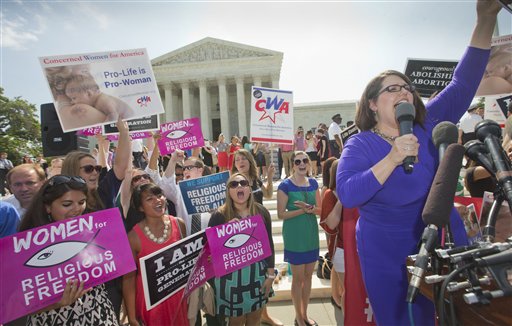Given the narrowness of Monday's Supreme Court decision on Obamacare's contraception mandate, look for the words "closely held corporations" to be addressed in the near future in a court near you.
The 5-4 decision said closely held corporations such as the family-owned Hobby Lobby arts and crafts store and the Conestoga Wood Specialties company, in spite of being for-profit businesses, do not have to provide certain abortion-inducing contraceptives to their employees under the Affordable Care Act because to do so would violate their deeply held religious beliefs granted by the First Amendment and other laws.
The ruling thankfully affirms that family businesses may still make certain decisions about issues they believe to be injurious -- in this case, a decision that "substantially burdens the exercise of religion" -- without the threat of crippling fines. So don't expect Walmart or General Motors, for instance, to make -- or be granted relief in -- such a case.
But dissenting justices say the decision could allow other private businesses to challenge the law on religious reasons if they object to other services such as vaccinations, blood transfusions or medical devices derived from pigs. And the question of exactly what "closely held corporations" are will certainly be tested if the next plaintiff is not so plainly "closely held" as Hobby Lobby and Conestoga.
Justice Samuel Alito, writing for the majority in Burwell (formerly Sebelius) v. Hobby Lobby, said the contraception mandate not only violated the First Amendment but also the 1993 Religious Freedom Restoration Act (RFRA), which states the federal government can only force people to violate their religious beliefs "if the government has an extremely important reason" for doing so "and the government cannot accomplish its goal in any less restrictive way."
The distribution of birth control, much less abortifacients, should not be a function of the federal government in the first place, but the Affordable Care has put it there. But, even if the first part of the RFRA statement is conceded, there are other ways birth control drugs and devices can be distributed without burdening religious employers.
The decision was the first time the Supreme Court ruled in favor of a for-profit corporation that claimed its religious freedom allowed it to be exempt from a law.
But what, after all, are corporations made from except the people who formed them? Indeed, Alito said "a corporation is simply a form of organization used by human being to achieve desired ends. And protecting the free-exercise rights of corporations like Hobby Lobby, Conestoga and Mardel (Christian & Education Stores, which is owned by the Hobby Lobby family) protects the religious liberty of the humans who own and control those companies."
In fact, the ruling had somewhat of a precedent in the 2010 Citizens United case in which the Court ruled that corporations have free speech rights and, in turn, can spend freely in federal elections.
While the details surrounding the implementing of this decision may show up in court again, the Supreme Court in the fall may very well take up arguments from nonprofit faith-based employers who believe exemptions and accommodations to the Affordable Care Act are not broad enough.
Despite the narrowness of the ruling, the decision was a broadside to the Obama administration, which counted on the same court that upheld the Affordable Care Act two years ago to back its continued unprecedented expansion of government. And, ironically, it used the Religious Freedom Restoration Act, introduced by liberal Sen. Chuck Schumer, D-N.Y., and signed into law by Democrat President Bill Clinton, to make the case.
So for now, and for the Green family of Hobby Lobby and the Hahn family of Conestoga, the decision affirms the importance of the depth of belief people of faith can have, a depth of belief that impacts every area of their lives. Such a faith for people is not just idly spoken words in a house of worship on one day of the week but a way of living that is pervasive in their family, their finances and, certainly, their work.

